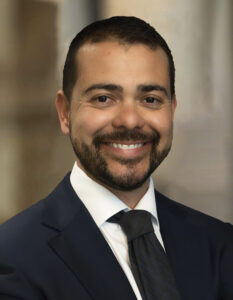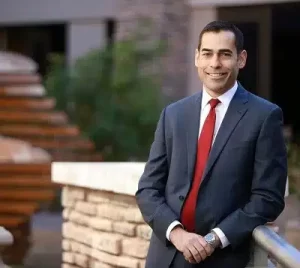Best Criminal Lawyer in Maricopa County, AZ
Michael R. Tamou
Criminal Lawyer
Tamou Law Group PLLC is a top Arizona law firm dedicated to DUI defense. Founded by Award Winning Criminal Defense Attorney Michael R. Tamou on the principles of integrity, professionalism, and dedication, we are committed to providing exceptional legal representation for clients facing DUI charges throughout the state.
With former prosecutors and law enforcement officers on our team, we offer aggressive, personalized defense strategies tailored to each client’s unique situation. We understand how overwhelming a DUI charge can be, and our experienced attorneys are here to guide you through every step of the process, ensuring you receive the strongest defense possible.
Whether it’s your first DUI or a more complex charge, Tamou Law Group will support you from the initial stop to trial if necessary. Our main priority is protecting your rights and working toward case dismissal or the best possible outcome.
Amy M. Leonard
Criminal Lawyer
Attorney Amy M. Leonard has dedicated her legal career to handling an array of matters involving criminal law. From nonviolent drug offenses and DUI charges to the most serious felony and federal crimes, Attorney Leonard has accumulated thousands of hours of experience creating effective defense strategies to protect the rights and futures of her clients. When handling cases, she also draws from a background in criminal pre-trial, trial, and appellate writing.
Prior to joining the legal team at Suzuki Law Offices Amy spent time as an associate attorney at a San Francisco-based plaintiff’s firm. She then moved to Phoenix, AZ with her family in 2001 and worked with a plaintiff’s firm before being admitted to the Arizona State Bar in 2004.
Attorney Leonard earned her Bachelor of Science Degree in Political Science and Economics from Santa Clara University before receiving her Juris Doctor from the University of San Diego School of Law in 1996. After law school, she interned at the San Francisco District Attorney’s Office and the Federal Public Defenders Office in San Diego, where she gained valuable criminal law experience from both sides of the courtroom.
Amy is a member of the Arizona State Bar and is licensed to practice law in Arizona and the U.S. District Court of Arizona. She has also been admitted to the State Bar of California.
Matthew L. Lopez
Criminal Lawyer
Matthew Lopez is one of the top rated criminal defense and DUI lawyers in Arizona. His attention to clients and dedication to the legal profession has resulted in countless case dismissals and charge reductions. Matthew provides free consultations to discuss effective case strategies with potential clients. As the owner of Matthew Lopez Law, he encourages his support staff and attorneys to treat clients with the highest level of respect.If you need free legal advice, the attorneys at Matthew Lopez Law are available 24/7, 365. Matthew Lopez believes that everyone should be able to receive the highest level of legal representation for their criminal defense or DUI case. We offer reasonable fees, affordable payments plans, and represent clients throughout the entire State of Arizona.
Professional Associations
- Arizona Association for Criminal Justice, 2010 to Present
- Arizona Association for Justice, 2010 to Present
- Arizona Trial Lawyers Association
Honors
- Nominated as a recipient of the National Trial Lawyers Top 40 Lawyers Under 40
- One of Arizona’s 10 best DUI attorneys for client satisfaction
- “Superb” 10/10 rating by Avvo
- Named as a Rising Star by Super Lawyers
- Member of the National College for DUI Defense
- Member of DUI Defense Lawyers Association
- Lead Counsel Rated
William H. Wynn
Criminal Lawyer
William H. Wynn focuses his practice on both criminal defense and civil litigation matters. Experienced in both felony and misdemeanor cases, he is dedicated to providing his clients with not only the best possible representation, but also the information required to make sense of the oftentimes confusing criminal justice system.
During law school, William worked as an intern at the Maricopa County Attorney’s Office. His time there taught him the intricacies of the criminal justice system and also gave him insight into how prosecution in Maricopa County operates. He is able to use this experience as a tool in negotiating a dismissal, reduction in charges, and at trial.
Prior to joining the Law Offices of David A. Black, William worked for private law firms. This gave him an understanding of how the legal system works, and the experience of using that knowledge to his clients’ advantage.
At the Law Offices of David A. Black, William handles all types of criminal matters – from misdemeanors to serious felony charges. He is an experienced trial attorney who is willing and able to fight for the best possible outcome for his clients.
Outside of the office, William spends his time enjoying the outdoors, playing the piano, and spending time with his family.
J. Blake Mayes
Criminal Lawyer
Attorney J. Blake Mayes is a Founding Partner of Mayes Telles PLLC who represents clients in criminal defense and personal injury matters across Arizona.
A Phoenix native, Mayes chose to pursue the practice of law to help provide a voice to people who may not be in a position to help themselves, and has become known throughout the local and legal communities for his client-focused approach and unwavering commitment to advocacy.
Over the course of his career, Mayes has helped numerous clients protect their rights, freedoms, and futures in a range of complex and high-stakes cases. That includes personal injury cases where plaintiffs must fight back against powerful insurance companies that so often prioritize profits over people, and criminal proceedings where overzealous prosecutors too often lump defendants together and employ a one-size-fits-all approach for doling out the harshest punishment possible.
Mayes’ practice is based on the belief that each client’s case, circumstances, and goals are unique, and that their unique story plays and invaluable role in tailoring a carefully crafted plan of attack.
Regarded for his ability to cultivate close client-attorney relationships, Mayes helps individuals and families understand what can often be an unfamiliar, confusing, and daunting process, leveraging empathy and understanding that the situation in which clients find themselves can be their first experience with the civil or criminal justice system – or the collective product of their background, police / prosecutorial overreaching, and mistakes in judgment we are all capable of making.
Such an approach has earned Mayes the respect and esteem of his peers and professional colleagues, and the trust of local communities and clients who turn to Mayes Telles in times of need, and refer friends and loved ones when they need proven representation.
Andrew C. Marcantel
Criminal Lawyer
Andrew C. Marcantel is a criminal defense attorney with a passion for freedom, individual rights, and government accountability. With a background in legal philosophy and constitutional law, Andrew excels at applying an out-of-the-box approach to contemporary criminal law issues in all of our client’s cases. As an attorney for The Attorneys For Freedom Law Firm, Andrew avidly serves his community by defending its citizens’ rights and holding the government to the standards imposed by the state and federal Constitutions.
Andrew earned his B.A. in Philosophy from the Barrett Honors College at Arizona State University, graduating with honors and receiving seven Dean’s List Recognitions throughout the course of the program. Andrew completed the Philosophy, Politics, and Law Certification Program through the Honors College, and worked with various faculty members to serve as a student mentor in the Honors program. Throughout his undergraduate years, Andrew published several articles on the subjects of moral philosophy, ethics, and literature, receiving notable recognitions and scholarships sponsored by the University.
Upon completing his undergraduate degree, Andrew earned his Juris Doctorate from Sandra Day O’Connor College of Law at Arizona State University, receiving a CALI Excellence for the Future Award for his achievement in the subject of Philosophy of Crime and Punishment. While in law school, Andrew worked for two years as a Certified Limited Practice Student and Legal Research Specialist at a respected Scottsdale, Arizona law firm, and gained experience on hundreds of state criminal and civil matters, all before even graduating from law school.
Since joining The Attorneys For Freedom Law Firm in 2014, Andrew has aggressively defended our clients in hundreds of cases, including major federal felony trials, state felony cases in every county in Arizona, and misdemeanor cases in numerous municipal and justice courts. Andrew has been featured in numerous national news outlets for his work on high-profile cases and is regularly called to speak at local events, schools, gun shows, legal conferences, and national podcasts on a variety of legal topics. In addition, Andrew is a member of several highly respected national defense organizations, including the National Association of Criminal Defense Lawyers.
Jason Bassett
Criminal Lawyer
As a Deputy Maricopa County Attorney for over six years, David prosecuted all types of serious felony cases. He also worked extensively in the Sex Crimes Bureau, where he prosecuted nearly every kind of sex offense. David has received comprehensive training in all areas related to sex crimes investigations including forensic interviewing of children, the use of DNA, analyzing medical evidence, and forensic computer analysis.
David later joined the City of Scottsdale Prosecutor’s Office, where he focused on DUI prosecution and underwent extensive DUI training and Standardized Field Sobriety testing, including courses required of police officers to conduct DUI investigations.
David then took his vast experience as a prosecutor to fight for the accused. He worked for nearly six years at one of Arizona’s largest criminal defense law firms, eventually becoming the lead attorney and handling the most serious cases while training other attorneys. In doing so, he obtained excellent results for countless clients by dismissal, favorable pleas, as well as numerous trials at every level.
As a partner and owner at Grand Canyon Law Group, David uses his legal knowledge and skills to provide customized help to his clients. David focuses all of his attention on getting the best result for every client. He knows that the justice system can be heavily weighted against criminal defendants, which is why he fights hard for each and every person he represents.
Marc C. Gann, Esq.
Criminal Lawyer
In 2005, Attorney Joshua S. Davidson founded the Davidson Criminal Defense & DUI Law Firm. While the legal team is experienced in various areas of law, we solely focus our practice on criminal defense and DUI defense law.
Having been a member of the bar since 1998, Mr. Davidson is licensed to practice in all state and federal courts in Arizona. As the founder of the firm, he will personally handle your case. Because Attorney Davidson understands that during this difficult time you need to work with someone you know and trust, he never hands cases off to associates.
Prior to Founding the Firm
Attorney Davidson’s path to becoming a criminal defense attorney began when he graduated from the University of Arizona with a Bachelor of Science degree in Finance. After receiving his Bachelors, he earned his Juris Doctor from the Emory University School of Law in Atlanta, Georgia.
What Is the Difference Between Manslaughter and Murder?
When it comes to serious criminal offenses involving the death of a person, terms like “manslaughter” and “murder” are often used. While both manslaughter and murder involve the unlawful killing of another person, the key difference lies in the circumstances surrounding the crime and the intent of the perpetrator. This distinction is crucial, as it determines the severity of the charges and the resulting penalties.
We will explore the legal definitions, elements, and various degrees of both manslaughter and murder to provide a clearer understanding of the differences between the two.
Definition of Murder
Murder is the more severe of the two offenses and is defined as the unlawful killing of another human being with “malice aforethought.” The concept of malice aforethought means that the perpetrator acted with the intention to kill or cause serious harm, or demonstrated a reckless disregard for human life. Murder is usually classified into two main degrees: first-degree murder and second-degree murder.
1. First-Degree Murder
First-degree murder is the most serious type of homicide. It involves premeditation, meaning the killing was planned or deliberate. The perpetrator must have formed the intent to kill and then acted upon that intent. Premeditation does not necessarily mean that the act was planned for a long time; it can be formed in a very short period before the actual act, but the key element is the purposeful nature of the crime.
Other circumstances that elevate a killing to first-degree murder may include:
- The use of particularly cruel methods, such as torture.
- The killing of a law enforcement officer.
- Felony murder, where a person is killed during the commission of another serious crime, like robbery or kidnapping.
Because first-degree murder is seen as the most intentional and egregious form of homicide, it carries the harshest penalties, including life imprisonment without parole or, in some jurisdictions, the death penalty.
2. Second-Degree Murder
Second-degree murder also involves intentional killing, but without premeditation or deliberation. The act may be spontaneous or occur during a heat-of-the-moment situation. However, second-degree murder still requires malice aforethought, meaning the perpetrator either intended to cause death or serious injury or acted with reckless indifference to human life.
An example of second-degree murder would be a person getting into a heated argument and, in the spur of the moment, fatally striking the other person without any prior intent to kill.
Because second-degree murder lacks the planning and premeditation of first-degree murder, the penalties, though severe, are usually less harsh. Typical sentences range from 15 years to life imprisonment, depending on the circumstances and jurisdiction.
Definition of Manslaughter
Manslaughter, unlike murder, generally refers to a killing that occurs without malice aforethought. The perpetrator did not intend to kill, or if they did, the circumstances surrounding the killing mitigate their culpability. Manslaughter is further divided into two categories: voluntary manslaughter and involuntary manslaughter.
1. Voluntary Manslaughter
Voluntary manslaughter occurs when someone kills another person in the “heat of passion” as a result of being provoked. In such cases, the provocation must be of such intensity that it would cause a reasonable person to lose self-control. The key element here is the lack of prior intent to kill, as the actions are spontaneous and occur in response to a highly emotional situation.
A classic example of voluntary manslaughter would be discovering a spouse in the act of infidelity and, in a fit of rage, immediately killing the other party. In this case, while the intent to kill exists, the emotions of the moment reduce the moral blameworthiness of the crime compared to murder.
The penalties for voluntary manslaughter are generally less severe than for murder but can still involve significant prison time, often ranging from 3 to 15 years, depending on the jurisdiction and specific circumstances of the crime.
2. Involuntary Manslaughter
Involuntary manslaughter, as the name suggests, involves an unintentional killing. This type of manslaughter usually occurs as a result of reckless or negligent behavior that leads to someone’s death. Unlike murder or voluntary manslaughter, there is no intent to kill or cause serious harm, but the perpetrator’s actions are deemed irresponsible enough to result in a criminal charge.
For instance, driving under the influence of alcohol and causing a fatal accident would typically be classified as involuntary manslaughter. The driver did not intend to kill, but their reckless behavior (driving while intoxicated) led to someone’s death.
Penalties for involuntary manslaughter are often the least severe of all homicide-related crimes, though they can still be quite significant, particularly when gross negligence is involved. Sentences can range from probation to several years in prison.
Key Differences Between Manslaughter and Murder
While manslaughter and murder both involve the unlawful killing of another person, the major difference is the element of intent and state of mind of the perpetrator. Murder requires malice aforethought, meaning the killer acted with intent or extreme recklessness, whereas manslaughter involves a lack of intent to kill or a killing under circumstances that reduce the moral culpability.
Here are the key distinctions between the two crimes:
- Intent: Murder involves intent to kill or extreme recklessness, whereas manslaughter often involves no intent to kill or a killing that occurs under emotional duress or negligence.
- Premeditation: First-degree murder requires premeditation, while manslaughter typically occurs without any planning.
- Mitigating Circumstances: Manslaughter cases often involve mitigating factors, such as provocation or reckless behavior, which reduce the moral blameworthiness compared to murder.
- Penalties: The penalties for murder are typically much harsher than for manslaughter. First-degree murder may result in life imprisonment or the death penalty, while manslaughter carries lighter sentences, though they can still involve significant jail time.
Legal and Moral Implications
The distinction between murder and manslaughter is significant in both a legal and moral sense. Murder is generally viewed as the more heinous crime due to the perpetrator’s intent and the level of planning involved. On the other hand, manslaughter, while still a grave offense, is considered less morally reprehensible because it often occurs without premeditation or under emotional distress.
Courts consider various factors when determining the appropriate charge and penalty, including the circumstances of the killing, the intent of the perpetrator, and any mitigating or aggravating factors.
Conclusion
Understanding the difference between manslaughter and murder is essential, especially in legal contexts where the specific charge can drastically affect the outcome of a case. While both offenses involve the unlawful killing of another person, the key difference lies in the intent and circumstances surrounding the crime. Murder involves malice aforethought, either in the form of intent or extreme recklessness, while manslaughter generally involves less culpability due to a lack of intent or emotional provocation. As a result, the legal and moral weight of each crime varies, as do the associated penalties.












